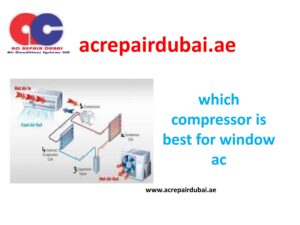Introduction to Window AC Compressors
Window air conditioners are a popular choice for cooling smaller spaces efficiently. The heart of any AC unit lies in its compressor, responsible for circulating refrigerant and facilitating heat exchange. Selecting the right compressor is crucial for optimal performance and durability.
Rotary Compressors: Efficiency and Quiet Operation
Rotary compressors excel in efficiency and quiet operation, making them an ideal choice for window AC units. They operate smoothly, with fewer moving parts, reducing friction and noise levels. This type of compressor is known for its reliability and ability to maintain consistent cooling performance.
Scroll Compressors: Enhanced Performance
Scroll compressors offer enhanced performance and energy efficiency compared to traditional reciprocating compressors. Their unique design minimizes energy consumption while providing reliable cooling. This makes them suitable for window AC units aiming for high efficiency and cost-effectiveness.
Inverter Compressors: Precision Cooling
Inverter compressors are renowned for their precision cooling capabilities. They adjust their speed according to the cooling demand, resulting in significant energy savings and precise temperature control. Window AC units equipped with inverter compressors offer quiet operation and consistent comfort levels.
Reciprocating Compressors: Traditional Reliability
Reciprocating compressors have long been a staple in air conditioning systems for their reliability and simplicity. While they may produce more noise compared to rotary or scroll compressors, they are still a viable option for window AC units, especially in smaller spaces where noise level is not a primary concern.
Variable-Speed Compressors: Adaptive Cooling
Variable-speed compressors offer adaptability and efficiency, adjusting their speed to match the cooling requirements of the space. This results in energy savings and improved comfort levels. Window AC units equipped with variable-speed compressors are suitable for areas with fluctuating cooling needs.
Digital Inverter Compressors: Advanced Technology
Digital inverter compressors utilize advanced technology to optimize cooling performance. They operate at varying speeds to maintain precise temperature control, reducing energy consumption and extending the lifespan of the compressor. Window AC units featuring digital inverter compressors offer efficient and reliable cooling.

Hermetic Compressors: Sealed Performance
Hermetic compressors, also known as sealed compressors, are designed for durability and reliability. They are tightly sealed to prevent leaks and contamination, ensuring long-term performance. Window AC units with hermetic compressors are suitable for harsh environments and applications where reliability is paramount.
Piston Compressors: Simple and Robust
Piston compressors, also known as reciprocating compressors, are simple and robust, making them a cost-effective option for window AC units. They rely on the up-and-down motion of a piston to compress refrigerant and provide cooling. While they may be louder than other compressor types, they offer reliable performance at a lower initial cost.
Twin Rotary Compressors: Enhanced Efficiency
Twin rotary compressors offer enhanced efficiency and quieter operation compared to single rotary compressors. They feature two rotors working in tandem to compress refrigerant, resulting in smoother operation and reduced vibration. Window AC units equipped with twin rotary compressors are suitable for noise-sensitive environments and deliver consistent cooling performance.
Choosing the Right Compressor
In conclusion, selecting the best compressor for a window AC unit depends on various factors such as efficiency, noise level, and cooling requirements. Rotary, scroll, inverter, and variable-speed compressors are among the top choices for their reliability, efficiency, and precision cooling capabilities. Understanding the unique features of each compressor type can help consumers make informed decisions to ensure optimal comfort and energy savings.



